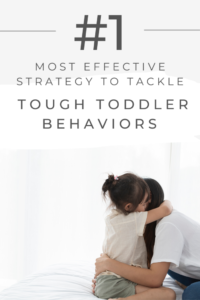
Learn effective techniques and strategies to overcome toddler power struggles and regain peace in your household. Say goodbye to tantrums and hello to a harmonious family dynamic.

Do you feel as if almost overnight your sweet snuggly baby turned in to an opinionated power-hungry toddler? Are you feeling a mix of emotions of love, joy, frustration, and exhaustion all at one while attempting to navigate toddler power struggles?
Are you overwhelmed by even the simplest tasks becoming a big challenge with tears and tantrums? Well, you are not alone, and I’ve got some tips that will help end those challenging power struggles and make life with your little one easier and more joyful.
Hi! My name is Marra and I’m a mama of a sweet toddler and a pediatric occupational therapist. I’ve spent years working in Early Intervention with children ages birth to three years with different developmental needs and supporting their families through the ups and downs of child development.
The majority of children I worked with were two years old. That’s right, I choose to spend my work week with toddlers.
I love toddlers and think this is such an amazing developmental stage. They really don’t deserve the bad rep they sometimes get.
That being said, life with a toddler can be challenging. I’m right there with you. I haven’t slept in three nights because my daughter is getting her two-year-old molars.
I’m trying to keep up with the highs and lows of toddlerhood myself. You are not alone.
I’d like to offer you some hacks, tips, and tools that has helped not only helped the many parents of toddlers I’ve worked with with toddler power struggles, but I’ve found helpful with my daughter firsthand.
Before we talk about the strategies to make your life with a toddler more manageable, we first need to understand some important things about what it means to be a toddler.
This post is all about tips to end toddler power struggles!

WHAT'S REALLY GOING ON WITH THE TODDLER POWER STRUGGLE?
So why toddler power struggles? Why are toddlers so power-hungry? Why do they always need to feel in control?
Recently, my daughter has been saying the oh-so-powerful “NO!” in response to everything I say. Even if she says “yes,” she first has to lead with a very strong “NO!”
It’s as if she is saying, “I’m in charge! Even when I agree with you.” Is anyone else experiencing this?
Understanding more about early childhood brain development and why our the toddler power struggles exist can really help us to implement powerful strategies to help.
Every child develops at his or her own pace but with typical developmental patterns. Sometime between the ages of two and three, your little one discovers that he or she is an individual person, and this is a powerful discovery!
For about the first two years of life, infants haven’t developed the concept of individual identity. They think they are an extension of their parents.
This is why they want to constantly be so close to and held by their caregivers. They depend on others to meet their every need.
Something amazing happens when our littles transition from infancy to toddlerhood. They discover that they are not an extension of their parent, but they are a separate individual person. Toddlerhood is marked by the discovery of individual identity.
This is extremely powerful and really exciting for these little people. They learn concepts such as “I am me!” “I am separate from mom and dad” and the very fun “I can disagree with my parents”.
Toddlers do not want to disagree and say NO to frustrate you, annoy you, or make life difficult. I hate to be the bearer of bad news, but they are still way too young to consider how you feel.
They are disagreeing with you and want to be in control because it is exciting and empowering to be independent and have your own opinion, and finally have words that you can use to express yourself.
This is great developmentally, however it does lead to those toddler power struggles.
TODDLER'S LIVE IN THE PRESENT MOMENT
It’s also really important to understand that toddlers are always living in the present moment. This alone might lead to many of the toddler power struggles.
They have not yet developed the higher cognitive areas of the brain responsible for concepts like time, schedules, before and after, they are always living in the present and the only thing that exits for then is the now.
This is really difficult for us as adults to understand. I don’t know about you but staying present is a challenge for me.
I feel like my schedule is running the show most days. Maybe you are better at staying present then I am and could offer me some tips.
This is important to understand because as parents we often tell our little ones that we are almost done, or it won’t take long during non-preferred activities. This is hard for toddlers to understand because in their mind all that exists is the now and if they are doing something they don’t like, it’s all that exists.
Toddlers also don’t understand schedules the way we do. Imagine not having any control in your day.
Everything is decided for you. That’s got to be hard for them sometimes. This is why they want control whenever they can get it, hence all those toddler power struggles.
Ok, now that we have discussed some of the basic concepts of toddlerhood, let’s look at a few strategies that will help with those oh so fun toddler power struggles.

THEIR VOICES MATTER DURING TODDLER POWER STRUGGLES
The simple act of validating your toddlers voice, emotion, and opinions can go a long way. I might be doing things a little differently than most parents but I’m making a strong effort to teach my daughter that her voice is powerful and it matters.
This does not mean that she gets whatever she wants all of the time. This does mean that I want her to know that I hear her, I do my best to understand her, and take into consideration her opinions when I make decisions.
Right now we are on the bedtime toddler power struggle bus! I’m really trying to be consistent as possible and my girl would party all night long if I let her.
So for us, validating her opinion simply looks like telling her “I hear that you’re not tired and don’t want to go to bed. I understand you’re upset. You’re allowed to be frustrated but it’s bedtime.”
Even when we disagree, I still want to hear and validate her voice. This recognition of our toddlers strong emotions instead of correcting and ignoring can go a long way.
Another thing I’m trying to teach her is that all her feelings and emotions are ok but not all behavior is ok. I want to teach her that emotions and behaviors are separate.
In our home this looks like “I understand you are mad. You have every right to be mad. Mom gets mad too sometimes. You are not allowed to hit. You can use your words to say ‘I’m mad’”.
Separate the emotion from the behavior, validate the emotion, give an appropriate behavioral response. Being mad is ok, hitting is not.
Don’t we all want to be heard and understood by the people closest to us? When someone shows us compassion and shares that they’ve been there too, doesn’t that make us feel connected and less alone?
Our toddlers are no different. They to want to be heard and understood. The simple act of validating their opinion and letting them know their voice matters can go a long way.
This can help make those toddler power struggles a little easier.
ENCOURAGING INDEPENDENCE AND OFFERING CHOICES
Now that we have validated our toddler’s voice and opinion let’s use this to our advantage by decreasing the toddler power struggles.
By empowering your toddler to make choices and fostering their independence, you can create an environment that minimizes toddler power struggles and promotes a sense of autonomy.
Encouraging independence is not about letting your child have free reign, but rather providing them opportunities to make decisions and take responsibility for their actions within safe boundaries. This can help them feel more in control and reduce the need for toddler power struggles.
The good news here is that you as the parent can create opportunities for your toddler to have control in a way that benefits you and works with your schedule. Let’s look at an example.
Instead of saying “it’s time to get dressed”. Switch it to “Do you want to wear this shirt or this shirt today”.
Instead of creating an opportunity for toddler power struggles and a potential disagreement, you have just created an opportunity that gives them control of the situation.
You get done what you need to do – get your child dressed, and they are thinking that they are in control because they got to choose what to wear.
The simple choice between 2 options is really all toddlers need to feel in control and foster their independence. Most of us as parents can squeeze in 2 choices to any activity.
I don’t care how it gets done as long as it gets done. Here are the common examples I use every day,
Do you want to sit or stand when we brush your teeth? Do you want a red spoon or green spoon?
Do you want me to wash your hair first or belly first? Do you want to bring your baby or toy car in the car with us?
Do you want peppers or carrots for snack? Do you want to read this book or that book?
Choices everywhere. I could care less what color spoon she eats with or what body part we wash first.
I get things done and she’s feels like her voice matters. No toddler power struggles needed!
Transitions can be really challenging for toddlers. This goes back to their awareness of only the present moments and they’re not on a schedule the way we are.
Sometimes I feel like the transition is more challenging for my daughter than whatever the next activity is.
What can we do? Yes! Offer a choice for the transition. An example is transitioning to bath time from playing.
She loves bath but stopping the play to go to the bath is hard. So I ask her “Do you want a piggy back ride, or to jump to the bath”. Then she gets to choose and have some power in the situation
By implementing these techniques, you can bid farewell to those exhausting tantrums and embrace a peaceful and balanced home.
But don’t just let these strategies gather dust within the pages of this guide. Take action today and witness the transformation within your household.
